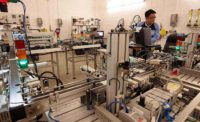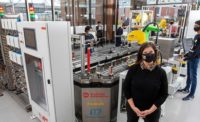The manufacturing world is in the midst of one of its greatest disruptions ever. Digital production, smart factories and Industry 4.0 rank up there with the advent of the steam engine 322 years ago, the first moving assembly line 107 years ago and the debut of industrial robots 59 years ago.
The Carnegie Mellon University (CMU) Manufacturing Futures Initiative (MFI) is at the leading edge of this sweeping change. It focuses on “groundbreaking research in the digital transformation of manufacturing to accelerate innovation for economic prosperity.”
The goal of the three-year-old MFI is to accelerate discovery and commercialization of new technologies for end-to-end data collection and analysis in manufacturing.
“Our unique culture of advanced collaboration drives both the necessary convergence of disciplines inside the university and robust partnerships with industry, nonprofits and government,” says Sandra DeVincent Wolf, Ph.D., executive director of MFI.
“MFI creates a highly collaborative, advanced manufacturing research ecosystem that drives the digital transformation of manufacturing, the accelerated translation of associated research discoveries toward commercialization, and the concomitant methodologies and technologies to enhance the workforce,” adds Wolf.
“MFI is committed to leading groundbreaking research in the digital transformation of manufacturing,” explains Wolf. “It is focused on enabling the research and partnerships that bring machine intelligence (virtual modeling, data analytics, cybersecurity, cloud computing, mixed reality and artificial intelligence) together with physical manufacturing technologies (design, materials discovery, robotics, additive manufacturing, biomanufacturing and nanofabrication) and human intelligence (learning science, policy and ethics) to accelerate innovation.
“This [effort] applies to the technologies themselves, as well as the workforce development necessary to support them,” Wolf points out.
Ironically, the CMU engineers focusing on 21st century manufacturing challenges and issues are housed in an off-campus building that was once synonymous with 19th century manufacturing: a former steel mill.
The MFI recently moved into a renovated facility that was once part of a Jones & Laughlin/LTV Steel Co. plant in the historic Hazelwood section of Pittsburgh. The neighborhood along the banks of the Monongahela River was also home to Pittsburgh’s last operating steel mill, LTV’s Hazelwood Coke Works, which closed in 1998 and was demolished the following year.
The new building, dubbed Mill 19, also houses Advanced Robotics for Manufacturing, the nation's Manufacturing USA Institute dedicated to creating the ecosystem that will drive innovation in robotics. Mill 19 is a 1,500-foot-long, 180,000-square-foot structure that formerly served as a rolling mill. New interior construction and renovation was done entirely within the framework of the old steel mill, which was built by Jones & Laughlin during the middle of World War II.
“We are excited to be able to provide a home for students, faculty, government and industry partners alike to come together to foster revolutionary ideas in the field of manufacturing and are committed to making this a vibrant resource,” says Wolf. “The opening of Mill 19 is a bold next step, one that will serve to further the vision of transforming manufacturing and catalyzing economic development in Pittsburgh and beyond.
“With its reopening, Mill 19 once again represents the region’s leadership in manufacturing,” notes Wolf. “The advanced manufacturing facility will allow the expansion of CMU’s research in Industry 4.0 technologies such as additive manufacturing, artificial intelligence, augmented reality, data analytics, robotics and sensing."
“It also provides a venue for close partnerships with industry and government that include the opportunity for partners to work on-site with CMU researchers to advance the projects that are underway at Mill 19,” adds Wolf.
Some recent research projects related to Industry 4.0 and smart factories have included topics such as expert guided machine learning to identify candidate parts and subassemblies for additive manufacturing; data-driven fault detection and prediction in advanced manufacturing systems; emerging manufacturing technologies and the demand for skills; and optimal parts consolidation and structural redesign for additive manufacturing to reduce weight, production costs and life cycle greenhouse gas emissions.
“Another recent project involved distributed learning for large-scale, multirobot path planning,” says Wolf. “By building a hybrid environment consisting of numerous simulated and physical robots, this project will enable large-scale automation of existing factories and warehouses.
“[Today], IoT devices used in manufacturing, such as 3D printers and robotic arms, are attractive targets for cyberattackers,” warns Wolf. “[Because of this], one of our recent projects has focused on precise profiling and protection…to provide effective [security] for IoT devices.”
MFI engineers are also working on a project that involves data-driven fault detection and prediction in additive manufacturing.
“While automation dramatically boosts productivity, precision and efficiency in manufacturing, a shortcoming is that unforeseen faults in the system are difficult to diagnose,” explains Wolf. “By using a reinforcement learning framework, researchers can take a global view of the operations of a manufacturing plant to efficiently diagnose system faults.”



